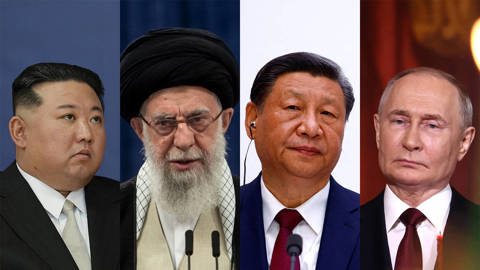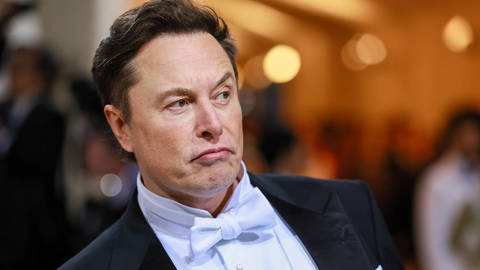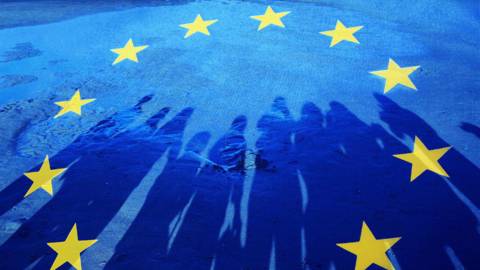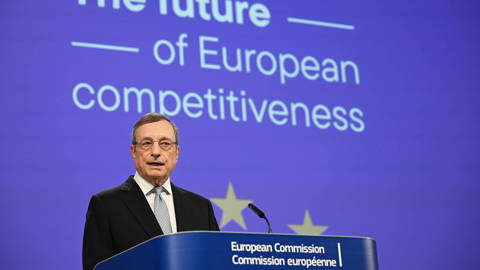Before the recent European Parliament elections, polls and pundits were predicting that far-right groups would win a record number of seats, dealing a harsh blow to Europe’s mainstream political parties. But while far-right parties made gains, and Greens, social democrats, and liberals lost seats, Europe’s mainstream center-right faction, the European People’s Party, has maintained its dominance.
The “de facto (winningest) leader” of the EPP is Polish Prime Minister Donald Tusk, whose Civic Coalition (KO) achieved the “best performance of all major mainstream parties,” notes Sławomir Sierakowski, founder of Krytyka Polityczna. Tusk has been “uncompromising” in opposing “anti-democratic illiberalism” since he ousted the right-wing populist Law and Justice (PiS) party from power last fall, and KO’s success, argues Sierakowski, reflects a strategy that “made this election about the very fate of the European Union.”
Denmark also offers lessons for resisting the far right, points out Michael Ehrenreich, a former director of the Danish Foreign Policy Society. Since the far-right Danish People’s Party made major electoral gains a decade ago, the established political parties have successfully pushed it back to the margins, partly by adopting “elements of [its] policy positions, especially on immigration.” Still, “constant vigilance” is needed to keep the far right at bay.
That vigilance may have been lacking in France, where Marine Le Pen’s right-wing National Rally won twice as many votes as President Emmanuel Macron’s Renaissance party. In response, Macron immediately called a snap election. After being “unable to govern the country” since losing his parliamentary majority two years ago, observes Sciences Po’s Zaki Laïdi, Macron feels he has nothing to lose. “If National Rally does come to power,” it will merely give voters a “taste of what [the party] truly represents before the 2027 French presidential elections.”
Philippe Legrain, Visiting Senior Fellow at the London School of Economics’ European Institute, praises Macron’s decision to dissolve the National Assembly. Though “pro-EU parties will still command a majority in the next [European] Parliament,” and “far-right parties are deeply divided,” mainstream parties must not be complacent. “Calling the populists’ bluff,” as Macron is doing, “offers the best chance of victory” against the far right, “by showing how their radical policies could backfire.”
But the risks of a far-right victory should not be underestimated. In Slovakia, the Atlantic Council’s Soňa Muzikárová explains, a “toxic political climate and deepening polarization” contributed to the attempted assassination in May of Prime Minister Robert Fico, whose “anti-democratic government” is now attempting to “exploit the tragedy to suppress the opposition and independent media.” Even if the shooting bolsters popular support for Fico, “the opposition and the media must continue to scrutinize and challenge the ruling coalition.”
Slovakia is not an outlier. Contrary to what “most of the mainstream media” would have us believe, argues Slavoj Žižek of the Birkbeck Institute for the Humanities at the University of London, the election results show that “Europe really is moving to the radical right.” Instead of accommodating the far right by disregarding the “axiom of post-World War II European democracy, ‘No collaboration with fascists,’” mainstream parties and politicians must act “as forcefully and as fast as possible” to resist the “new fascism.”










Before the recent European Parliament elections, polls and pundits were predicting that far-right groups would win a record number of seats, dealing a harsh blow to Europe’s mainstream political parties. But while far-right parties made gains, and Greens, social democrats, and liberals lost seats, Europe’s mainstream center-right faction, the European People’s Party, has maintained its dominance.
The “de facto (winningest) leader” of the EPP is Polish Prime Minister Donald Tusk, whose Civic Coalition (KO) achieved the “best performance of all major mainstream parties,” notes Sławomir Sierakowski, founder of Krytyka Polityczna. Tusk has been “uncompromising” in opposing “anti-democratic illiberalism” since he ousted the right-wing populist Law and Justice (PiS) party from power last fall, and KO’s success, argues Sierakowski, reflects a strategy that “made this election about the very fate of the European Union.”
Denmark also offers lessons for resisting the far right, points out Michael Ehrenreich, a former director of the Danish Foreign Policy Society. Since the far-right Danish People’s Party made major electoral gains a decade ago, the established political parties have successfully pushed it back to the margins, partly by adopting “elements of [its] policy positions, especially on immigration.” Still, “constant vigilance” is needed to keep the far right at bay.
That vigilance may have been lacking in France, where Marine Le Pen’s right-wing National Rally won twice as many votes as President Emmanuel Macron’s Renaissance party. In response, Macron immediately called a snap election. After being “unable to govern the country” since losing his parliamentary majority two years ago, observes Sciences Po’s Zaki Laïdi, Macron feels he has nothing to lose. “If National Rally does come to power,” it will merely give voters a “taste of what [the party] truly represents before the 2027 French presidential elections.”
Philippe Legrain, Visiting Senior Fellow at the London School of Economics’ European Institute, praises Macron’s decision to dissolve the National Assembly. Though “pro-EU parties will still command a majority in the next [European] Parliament,” and “far-right parties are deeply divided,” mainstream parties must not be complacent. “Calling the populists’ bluff,” as Macron is doing, “offers the best chance of victory” against the far right, “by showing how their radical policies could backfire.”
But the risks of a far-right victory should not be underestimated. In Slovakia, the Atlantic Council’s Soňa Muzikárová explains, a “toxic political climate and deepening polarization” contributed to the attempted assassination in May of Prime Minister Robert Fico, whose “anti-democratic government” is now attempting to “exploit the tragedy to suppress the opposition and independent media.” Even if the shooting bolsters popular support for Fico, “the opposition and the media must continue to scrutinize and challenge the ruling coalition.”
Slovakia is not an outlier. Contrary to what “most of the mainstream media” would have us believe, argues Slavoj Žižek of the Birkbeck Institute for the Humanities at the University of London, the election results show that “Europe really is moving to the radical right.” Instead of accommodating the far right by disregarding the “axiom of post-World War II European democracy, ‘No collaboration with fascists,’” mainstream parties and politicians must act “as forcefully and as fast as possible” to resist the “new fascism.”